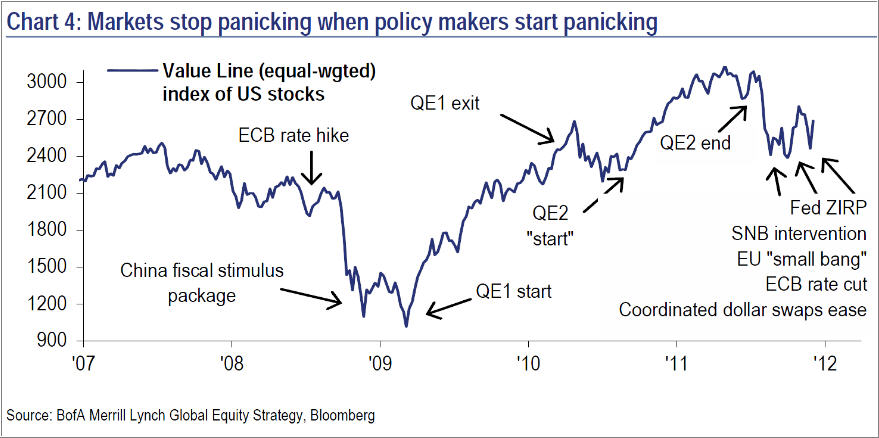Over the past few years, ever since the crash of 2008, I have mentioned repeatedly that we have not seen a ‘real’ economic recovery, only one based on a variety of stimulus efforts.
I finally found a chart in section 4 of a recent ZeroHedge article, supporting my viewpoint by outlining the entry and exit points of the QE attempts since early 2009. Take a look at the graph below:
[Click on chart to enlarge]QE1 started in March of 2009 coinciding with the low in the stock market and lasted until around April of 2010. Notice the market drop after the QE1 exit. It may not look like much in this chart, but in May/June 2010, the S&P 500 dropped over 13% and was ‘saved’ with the subsequent start of QE2.
Once QE2 ended around May 2011, the markets dropped again and were not really resuscitated by the Fed’s ZIRP program (Zero Interest Rate Policy), but remained in a sideways pattern for the past 6 months or so.
No wonder that investors became frustrated when sharp rallies were followed by huge sell offs, as a clear long-term trend was not sustainable, and all we got was a trend line dance within a trading range.
It makes me wonder where the S&P 500 might be at this time had it not been for the reckless stimulus efforts by the Fed. Stimulus has just about run out and, at the same time, is no longer politically acceptable.
Europe appears to be in shambles with no definite plans in sight to seriously address solvency problems. While equities may turn around and stage a Santa Claus rally, I fail to see how it can possibly have any staying power.
My weekly StatSheet numbers support the lack of upward momentum with the exception of bond ETFs and a few sector funds. This is not the time to be a hero and engage in bottom fishing, it’s the time to be concerned about capital preservation via the use of my recommend trailing sell stops.
While being mainly in cash during this every increasing uncertainty will not win you (or me) a popularity contest on Wall Street, it may let you sleep better at night knowing that a sudden turn for the worse in Europe will only have a limited effect on your portfolio.
Contact Ulli
